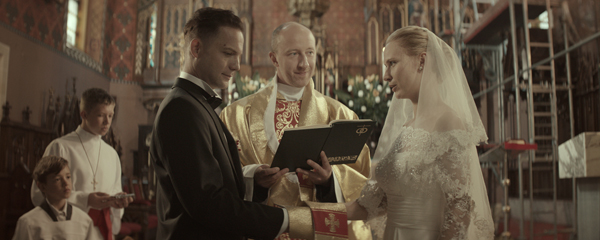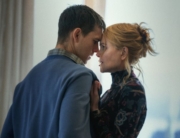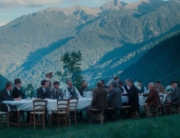Demon is a crackling, spookily atmospheric, intelligent, and sometimes funny ghost story. It builds upon one family’s secrets to take on a wider social and historical resonance, for Poland and for Polish Jews.
Peter (Itay Tiran) is excited to come to rural Poland from England to marry his pretty new bride, Zaneta (Agnieszka Zulewska), as well as for a new job with the construction company of her generous father, Zygmunt (Andrzej Grabowski). Proud to be reconnecting with his grandmother’s Polish heritage, he insists that he wants to fit in as “Piotr.” Zaneta’s boisterous brother, Jasny (Tomasz Schuchardt), served as the matchmaker for the couple’s online courtship.
As soon as Peter arrives at the dilapidated home village, Zygmunt announces his wedding gift of land, which happens to be encumbered by an old house and barn. A bulldozer is already conveniently in the yard for Peter to immediately start demolition. He barely has the chance to kiss his fiancée, though, before they are separated by extensive wedding preparations. Alone in the derelict house, on a stormy night full of scary noises, he starts to explore the grounds when he falls in a muddy ditch and onto a skeleton.
The next morning, his new family notices Peter’s odd behavior, but attributes it to nerves and the copious champagne. Though a disappointed, jealous beau named Ronaldo (Tomasz Zietek) is suspicious of the groom, the guests are already imbibing so much that they don’t notice Peter’s struggle to speak through the ceremony and toasts. The exception is Jasny, who is worried and sets out to find help.
The family consults the town’s experts, who have already started drinking: the local man of science, the doctor, and the town’s spiritual leader, the priest. The latter suspects a Jewish spirit possession; he thinks Peter is now speaking in Yiddish. As it is literally a dead language in Poland, the only person who would remember some words must be found, and thus an elderly professor reluctantly translates and realizes he is speaking to the spirit of the most beautiful, albeit Jewish, girl in his school growing up, Hana (Maria Debska). As seen in flashbacks, she was jilted by Peter’s father-in-law.
The Jewish spirit’s vengeance plays out amid the all-night festivities (this is an archetypal Polish wedding) as the band and the guests move about slowly and drunkenly in the leaky barn. For at least one cinematic reference, the soon-to-be runaway bridegroom becomes the target of a chase scene that recalls the classic search for a serial killer in Jerzy Kawalerowicz’s noir Night Train (1959). Underlining the story is the hidden reality of how some Poles took advantage of the waves of anti-Semitism that swept over Poland for property acquisition, such as seen in Wladyslaw Pasikowski’s Aftermath (2012).
The late director Marcin Wrona collaborated with the same filmmaking team from his first short, “Magnet Man” (2002), which won the Best Student Film Award at the Tribeca Film Festival, and onward to feature films. Despite almost no special effects here (that’s real mist and fog), the evocative sound design of Tomasz Sikora and the dark cinematography of Pawel Flis create such a suspenseful, creepy environment that some viewers may interpret this as a horror film.
Rather, the film plays on the theme of guilt by digging past Poland’s amnesia about its Jewish heritage. Wrona was born after the 1968 anti-Semitic purge of the last Jews in Poland who had returned post-Holocaust, and he had no exposure to the Jewish folklore of the dybbuk (“a cleavage of an evil spirit,” an unsettled soul attaching to a body) until seeing one referenced in Piotr Rowicki’s play The Clinging.
The rest of the world knows Shimon Ansky’s 1914 play The Dybbuk, which has been much translated and performed around the world. It was filmed in 1937 and served as the basis for three operas and two ballets, most famously in Jerome Robbins’s choreography to Leonard Bernstein’s score in 1974. The play centers on a dead fiancé inhabiting the bride to thwart her marriage to another man. Dybbuks have also figured in Paddy Chayefsky’s Tony-nominated play The Tenth Man (1959), Romain Gary’s novel The Dance of Gengis Cohn (1967), and more recently, the Yiddish prologue to the Coen Brothers’ A Serious Man (2009).
In a shivery parallel to Ansky’s death (before he could see his original play performed), Wrona died before Demon’s Polish premiere. His film is the preternatural capstone of Wrona’s trilogy on fate’s power over life and death: first the bittersweet My Flesh, My Blood (2009), also with a wedding (now streaming on Amazon), and then The Christening (2010), not available in America. While you may debate the concluding ambiguities, his talent continues to haunt us through this striking film.







Leave A Comment